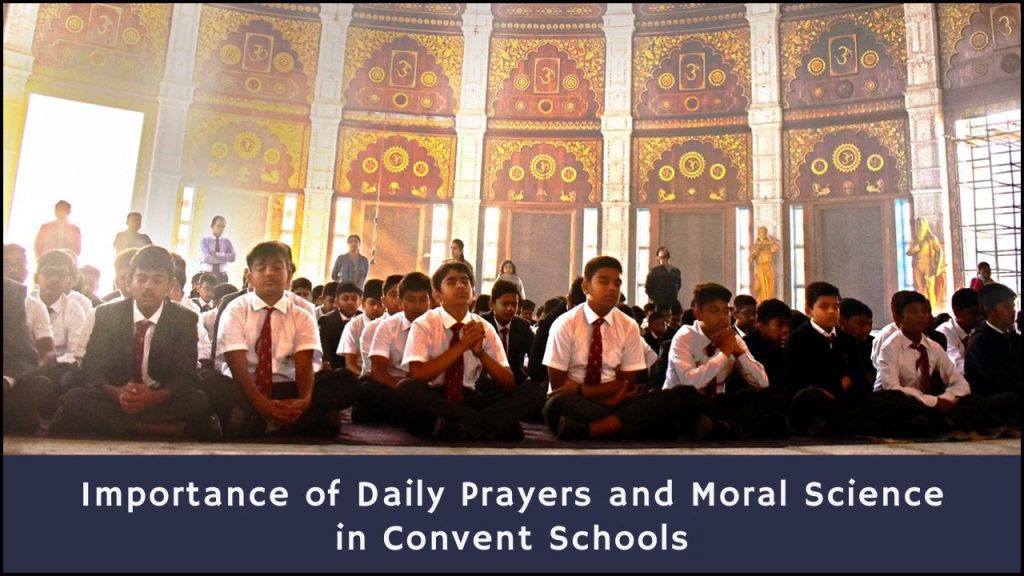
Daily prayers and moral science play an essential role in shaping young minds in convent schools. These two elements are not merely part of the school timetable but are deeply rooted in the foundation of value-based education. A convent school focuses on the all-round development of children, where spiritual growth and moral guidance are considered just as important as academic success. The inclusion of prayers and moral teachings creates an environment of discipline, respect, and compassion that influences students for life.
Table of Contents
Daily Prayers in Convent Schools
Purpose of Daily Prayers
- Spiritual Foundation – Daily prayers give students a spiritual start to the day, offering peace and clarity.
- Emotional Balance – Prayer time helps calm the mind, reducing anxiety and stress in young learners.
- Focus and Discipline – A structured prayer routine sets a disciplined tone for the school day.
- Unity in Diversity – Students from different backgrounds come together, promoting inclusivity and mutual respect.
- Moral Awareness – Prayers often include messages about kindness, truth, and patience, reinforcing good behaviour.
Structure of Daily Prayers
- Morning Assembly – The day begins with prayer in a common gathering, followed by a thought for the day.
- Special Intentions – Prayers include requests for strength, gratitude, or healing for someone in need.
- Hymns and Songs – Inspirational hymns build a peaceful and positive mood.
- Scripture Readings – Passages from religious texts are read aloud to share values and teachings.
Benefits of Daily Prayers
| Benefit | Explanation |
|---|---|
| Improved Concentration | Students who begin their day with prayer show better attention in classes. |
| Positive Behaviour | Prayers influence children to be polite, obedient, and helpful. |
| Community Feeling | Group prayer strengthens bonds among students and staff. |
| Respect for Faiths | Exposure to different spiritual ideas develops respect for all religions. |
| Courage and Patience | Daily prayers teach students to face challenges with strength and calmness. |
Moral Science in Convent Schools
Meaning of Moral Science
- Value Education – Moral science teaches right and wrong through stories, examples, and real-life situations.
- Character Building – Children learn honesty, responsibility, and compassion from a young age.
- Decision-Making Skills – Lessons help students understand consequences and make good choices.
- Respectful Relationships – Topics focus on kindness, respect for elders, and helping peers.
- Social Responsibility – Emphasis is given to caring for the environment and contributing to society.
Teaching Methods Used in Moral Science
- Storytelling – Moral tales leave a strong impression on young minds.
- Role Play – Students act out real-life situations to understand ethical behaviour.
- Class Discussions – Open conversations encourage expression and develop empathy.
- Activity Sheets – Worksheets with scenarios help students apply lessons to life.
- Visual Aids – Charts, drawings, and short videos support moral teachings effectively.
Core Topics in Moral Science
| Topic | Lesson Taught |
|---|---|
| Honesty | Truthfulness is the foundation of trust and self-respect. |
| Kindness | Small acts of help and care build strong communities. |
| Responsibility | Taking ownership of actions develops accountability. |
| Respect | Treating all individuals, animals, and nature with dignity is essential. |
| Teamwork | Working together builds unity and leadership skills. |
| Forgiveness | Letting go of anger makes room for peace and growth. |
| Gratitude | Being thankful fosters happiness and appreciation for life. |
Impact of Moral Science on Students
Development of a Strong Character
- Empathy Growth – Children learn to understand and share the feelings of others.
- Ethical Choices – Students make better decisions even outside the classroom.
- Conflict Resolution – Peaceful methods are chosen over aggression or revenge.
- Social Harmony – Respect and kindness taught in moral science encourage tolerance.
- Leadership Qualities – Students guided by values become dependable and fair leaders.
Comparison: Schools With and Without Moral Education
| Aspect | With Moral Science | Without Moral Science |
|---|---|---|
| Behaviour | Respectful, cooperative, and kind | Self-centred, undisciplined, and less tolerant |
| Decision-Making | Thoughtful and ethical choices | Impulsive and peer-pressured decisions |
| Emotional Control | Calm and understanding | Reactive and aggressive |
| Peer Relationships | Friendly and supportive | Competitive and often disrespectful |
| Sense of Duty | Strong sense of responsibility | Lack of commitment and careless attitude |
Connection Between Prayer and Moral Science
Mutual Support
- Spiritual Foundation Supports Morality – Daily prayers prepare the mind to receive moral teachings.
- Reinforcement of Values – Prayers often carry similar messages as moral science topics.
- Habit Formation – Regular practice of both builds a lifelong habit of values-based living.
- Peaceful Atmosphere – A calm environment created by prayer supports a deeper understanding of moral lessons.
- Faith in Action – Moral science encourages students to live the values they express in prayer.
Role of Teachers in Value Education
| Responsibility | Contribution to Students’ Moral Development |
|---|---|
| Role Modeling | Teachers serve as living examples of honesty, kindness, and discipline. |
| Interactive Lessons | Creative teaching methods make values memorable. |
| Observation and Feedback | Teachers guide children gently when they stray from expected behaviour. |
| Encouraging Reflection | Students are motivated to think about their actions and learn from them. |
| Reinforcing Daily Practice | Consistent encouragement helps students form good habits and moral thinking. |
Parent-School Partnership in Moral Growth
Support Beyond School
- Reinforcing Values at Home – Parents support school teachings through daily routines.
- Open Communication – Schools and families work together to handle moral or behavioural concerns.
- Shared Activities – Events like prayer services and value workshops include parents in the moral education process.
- Consistent Messaging – When both school and home promote the same values, children grow with clarity and confidence.
Moving Forward
Convent schools emphasize daily prayers and moral science not as extra activities but as core elements of education. A child raised with spiritual discipline and moral values grows into a responsible, kind, and confident adult. The deep influence of such teachings continues to guide decisions, shape relationships, and define character throughout life. An education built on values becomes the strongest foundation for future success.





